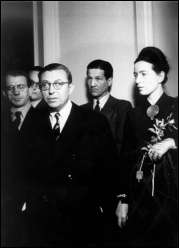|
Biograafia Simone de Beauvoir
French Existentialist, Writer, and Social Essayist
Born and educated in Paris, Simone de Beauvoir was among the first women permitted to complete a program of study at the École Normale Supérieure. Through her lifelong friendship with Sartre, she contributed significantly to the development and expression of existentialist philosophy.
Jean-Paul Sartre and De beauvoir met after her studies in the Sorbonne, the beginning of a friendship which lasted until his death in 1980. This period began what she described as a \'moral\' phase of life; the culmination of which was her most important philosophical work, The Ethics of Ambiguity(1948). She began the phase with an essay entitled Pyrrhus et Cineas(1944), and the earlier novel called L\'Envitee(1943).
No doubt born of the confusion and madness of WWII, De Beauvoir included in her Ethics Sartre\'s ontology of being-for-itself and being-in-itself. She also draws heavily on his conception of human beings as creatures who are free. Freedom of choice, humanity\'s utmost value, is the criterion for morality and immorality in one\'s acts. Good acts increase one\'s freedom, while bad ones limit that freedom.
Her final words on Sartre\'s death(and her own, in Adieux) were:
\"My death will not bring us together again. This is how things are. It is in itself splendid that we were able to live our lives in harmony for so long.\"
|





